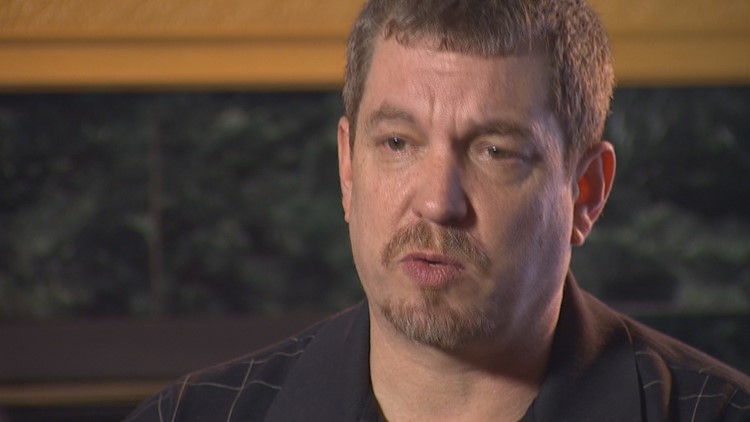On an April afternoon, Kevin and Brittany Albert of Seabeck walked into a bank in Silverdale and deposited a check with life-changing consequences.
“Oh my gosh, it’s been a long time coming. Thank God, thank God, thank God. It’s unbelievable,” said Brittany Albert.
Since mid-2016 Kevin Albert waged battle with his employer, the Puget Sound Naval Shipyard in Bremerton. He was fighting for over a year’s worth of back pay that by federal law, he was entitled to after becoming sick on the job – exposed to toxins such as cyanide inside a wastewater treatment facility on the base. The fight ended after a KING 5 investigation exposed his unfair predicament.
Efforts to obtain the compensation owed to him were unsuccessful for a year-and-a-half. During that time Albert wiped out his savings. He had to forego medical treatments, borrow money to pay the mortgage and turn to food banks to help feed his family.
“For a very long time I was in a very dark place,” said Albert. “I felt like I was beating my head against a brick wall for so long. It’s hard to explain to your autistic child while you’re having Top Ramen for dinner for the seventh time in a row.”
Four months after the KING 5 investigators aired a report exposing the inequities Albert faced, he got the phone call of a lifetime - a check in the amount of $61,147 was on the way.
“I cried. I could not believe it I was in complete shock. And in disbelief. I feel like I just won the lotto.”
Doctors at Harborview, Group Health, and Keiser Permanente have diagnosed Albert with reactive airways disease, irritable larynx syndrome, vocal cord dysfunction, anxiety, depression, and PTSD. Doctors from each facility have concluded his illnesses are due to “workplace exposure.”
Despite letters from the physicians, the Navy did not find him a new position that would accommodate his medical problems. Instead, he sat home with no paycheck.
“I don’t think (the Navy) cares,” said Albert. “What they did…the people that are affected need to be compensated and need to be accommodated. They haven’t done anything.”
The wastewater treatment plant was hailed as “state-of-the-art” by the Navy when it opened in 2006. But a six-month investigation by the KING 5 Investigators found that even as the doors first opened, complaints were piling up that the plant was unsafe: safety systems such as cyanide alarms didn’t work, pipes routinely leaked hazardous liquids such as cyanide water, and the ventilation system meant to draw toxic vapors out of breathing spaces was faulty as well.
Testing in 2013 finally led to the Navy temporarily shutting down the plant. Several internal investigations found that employees had been exposed above legal limits to chlorine gas and that systems meant to keep the workforce safe were “inoperable” or “inadequate.”
Despite these opinions by the Navy’s own experts, representatives of the shipyard’s public affairs office told KING 5 the treatment plant “is and always has been safe.” And that no employees have been exposed to vapors above legal limits.
In 2013 investigators from the U.S. Occupational Safety and Health Administration (OSHA) issued two “serious” violations to the Navy, including the failure to “identify and evaluate the respiratory hazards in the workplace.”
“In Building 1109, during cyanide destruction process, chlorine gas was emitted in levels above the (federally set legal limits), and the employer had not evaluated this respiratory hazard and (did not issue) appropriate respiratory protection,” wrote OSHA’s area director in 2013.
As Kevin Albert battled his health, he found himself waging another, unexpected fight – getting the help and compensation he needs and by federal law, is entitled to.
Civilian employees at the shipyard are to turn to the US Dept. of Labor’s Office of Workers’ Compensation Program (OWCP) after they experience a work-related illness or injury.
After a six-year wait, OWCP accepted Albert’s claims for irritable larynx syndrome and vocal cord dysfunction, but for his most serious condition – reactive airways disease – OWCP continued to issue denial letters.
“Your claim for compensation is denied as the medical evidence does not demonstrate that the claimed medical condition is related to (a) work-related event,” wrote a claims adjuster of OWCP in 2015.
“If I was the person making those decisions, I wouldn’t be able to sleep,” said Albert.
This opinion is in direct contrast to the opinions of seven different occupational medicine specialists and pulmonologists who determined his lung disease was directly caused or most likely caused by the Navy’s failure to keep him safe from toxic gasses.
In addition to the back pay for the months Albert was too sick to work, he will now receive his full, monthly paycheck until the Navy finds him a job away from toxins.
After the April bank deposit in Silverdale, Albert celebrated by putting gas in his car and making plans for a steak dinner.
“I was able to put gas in my car and not worry about overdrafts,” said Albert. “Money doesn’t buy happiness. Money doesn’t solve problems. But it can sure take the daily stress out of wondering how you’re going to feed your kids.”



